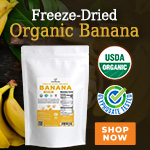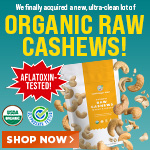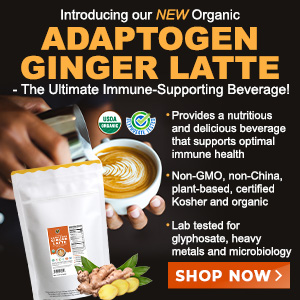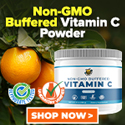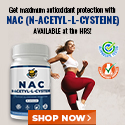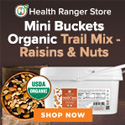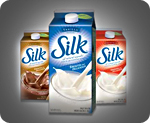
Dean Foods pulls bait-and-switch on "organic" Silk soymilk
 Tuesday, November 10, 2009 Tuesday, November 10, 2009by Mike Adams, the Health Ranger Editor of NaturalNews.com (See all articles...) Tags: Dean Foods, health news, Natural News |
- Newly released JFK files reveal Pentagon's role in creating Lyme disease and covid in the same lab
- Trump nominates VACCINE ZEALOT Susan Monarez to lead the CDC, sidelining RFK Jr.'s reform efforts
- BEWARE: USDA allows genetically engineered vaccines to infiltrate organic food production
- Obama accused of laundering USAID funds to fuel global protest movements, regime change operations
- Festive flavors: The sweet history, nutritional profile and health benefits of pecan pie
- Analysis: The coming economic collapse, a mass uprising and Trump's three secret weapons to halt the growing revolt
- Big Pharma's media takeover: How drug companies bought the news - and your health
- Dr. Mike Yeadon releases 15-minute testimony - WATCH - about genocidal intent of COVID “vaccines”
- Elon Musk: Aliens could be here on Earth RIGHT NOW
- Trump reverses course on Gaza plan, says “nobody is expelling Palestinians”
- Survival 101: Effective EMF blocking techniques
- Reclaim your health: How midlife exercise reverses years of inactivity
- California's social media censorship law struck down: A victory for free speech or a threat to online safety?
- Rep. Nancy Mace introduces bill to ban biological males from female facilities on federal property
- Big Pharma's $8 Billion bribery scheme exposed: how doctors are pushed to prescribe junk science, not heal
- RFK Jr.'s SSRI antidepressant investigation sparks liberal meltdown, exposes Big Pharma's dangerous game
- HUGE: Putin claims 2020 election fraud in U.S. sparked Ukraine war, calls for peace talks with Trump
- Pilots report mysterious lights 'moving at extreme speeds' across Oregon skies
- Elon Musk: Aliens could be here on Earth RIGHT NOW
- EPA advisor admits the agency is funneling billions to climate groups ahead of Trump’s return to White House
- Trump reverses course on Gaza plan, says “nobody is expelling Palestinians”
- Reclaim your health: How midlife exercise reverses years of inactivity
- A lack of integrity in Academia: Harvard professor found GUILTY of fraudulent research to promote CRT theory
- Space war brewing? Russia threatens to destroy Starlink satellites
- Big Pharma's $8 Billion bribery scheme exposed: how doctors are pushed to prescribe junk science, not heal
- Mike Adams Sermon 66: God will DESTROY ISRAEL for its wickedness
- Rep. Nancy Mace introduces bill to ban biological males from female facilities on federal property
- Survival 101: Effective EMF blocking techniques
- 5 Simple steps to boost your brainpower: How to strengthen executive function in a distracted world
- Historian warns Israel may be entering an “IRREMEDIABLE DECLINE”
- Florida takes a stand: DeSantis proposes permanent ban on mRNA vaccine mandates
- RFK Jr.'s SSRI antidepressant investigation sparks liberal meltdown, exposes Big Pharma's dangerous game
- New York politicians push bill allowing governor to indefinitely detain the unvaccinated on a whim
- Sales of survival bunkers rise following Russia’s use of the Oreshnik hypersonic ballistic missile
- Pilots report mysterious lights 'moving at extreme speeds' across Oregon skies
- Newly released JFK files reveal Pentagon's role in creating Lyme disease and covid in the same lab
- EPA advisor admits the agency is funneling billions to climate groups ahead of Trump’s return to White House
- The Health Ranger releases “Vaccine Zombie” song and music video, using AI-animated zombies for the music video
- The pandemic as a tool for INDOCTRINATION: Understanding “The Indoctrinated Brain” by Dr. Michael Nehls
- California's social media censorship law struck down: A victory for free speech or a threat to online safety?
- Dr. Mike Yeadon releases 15-minute testimony - WATCH - about genocidal intent of COVID “vaccines”
- Congratulations to the FULLY UNVACCINATED as you resisted the COVID-19 PROPAGANDA MACHINE fueled by over $100 BILLION
- Mike Adams releases country western hit single: Goin’ Back in Time is Comin’ Home
- RFK Jr. clears key hurdle: Sen. Susan Collins backs controversial HHS nominee, signaling a new era for health policy
- Mike Adams releases music poetry sensation: A Child of God
- Mike Adams releases new song and music video: Nothing More Disgusting Than a Globalist
- Unpacking the Lies That We’ve Been Fed – new song and music video released by Mike Adams, the Health Ranger
- Trump administration takes on global censorship: A new frontier for free speech advocacy
- Florida takes a stand: DeSantis proposes permanent ban on mRNA vaccine mandates
- “Why we influenced the 2020 elections”: Facebook files reveal the coordinated effort to bury the Hunter Biden laptop story
- Ex-FBI Chief EXPOSES disgraceful government coverups of Oklahoma City Bombing, Kennedy assassinations, 9/11 WTC, and "Terrorism" as plot to destroy Constitution
- Michigan sheriff announces criminal investigation into 2020 election crimes, Dominion Voting Systems
- Israeli soldiers accused of even more torture and abuse in the West Bank
- Federal judge backs Trump's mass firings, clearing path for government downsizing
- Red Cross issues warning to stop blood plasma donations from vaccinated people
- Scientists confirm: GENIUS brain function can be spontaneously unleashed in humans without any apparent cause
- EPA advisor admits the agency is funneling billions to climate groups ahead of Trump’s return to White House
- HYSSOP: What research reveals about the health benefits of this ancient holy herb
- Two containers with completed ballots fall out of truck in Florida
- Fully vaccinated about to see “tsunami” of illness and death, warns virologist
- Today I asked our AI language model “Neo” about which phytonutrients or phytochemicals can block the spike protein related to SARS-CoV-2 … Here is what it answered…
- Global leaders unite to clamp down on “misinformation” with UN-backed Cascais Declaration
- BREAKING: 2025 NDAA authorizes mandatory military draft of WOMEN across America… as Pentagon pursues global NUCLEAR war with both Russia and China at the same time
- Michael Yon warns of a ZIONIST TAKEOVER in Trump’s second administration
- BOMBSHELL: DNA testing kits are a SCAM to develop ethnic-specific bioweapons
- Ozempic and Wegovy weight loss drugs are injectable LIZARD VENOM PEPTIDES that may unleash a devastating wave of organ failure… side effects align with symptoms of SNAKE BITES
- Israeli soldiers accused of even more torture and abuse in the West Bank
- These 13 countries just signed an agreement to engineer a global FAMINE by destroying food supply
- NASA admits that climate change occurs because of changes in Earth’s solar orbit, and NOT because of SUVs and fossil fuels
- RFK Jr. clears key hurdle: Sen. Susan Collins backs controversial HHS nominee, signaling a new era for health policy
- Sermon 30: How Jesus reveals Caesar’s FAKE CURRENCY and FALSE AUTHORITY
- Coriander seeds: Ancient medicine backed by modern science
Many retailers and consumers never noticed the bait-and-switch tactic, so they kept buying Silk, thinking it was still organic. The shift on the product label from "organic" to "natural" wasn't well understood by consumers, either. Many consumers continue to think that the term "natural" is basically the same as "organic," when in fact they are almost opposites. The term "natural" is entirely unregulated, and almost anything can be claimed to be "natural" even when it's sprayed with pesticides or treated with other chemicals.
This bait-and-switch ploy continued throughout 2009 until a few watchdog organizations started to catch on to the covert switch. In late October, the Cornucopia Institute (www.Cornucopia.org) accused Target stores of misleading consumers by advertising Silk products using the old "organic" labeling even though the product being sold in stores was not organic. Cornucopia's Mark Kastel accused Target and Dean Foods for "blurring the line between organic and natural," thereby confusing consumers while boosting profits from the more lucrative sales of non-organic products sold at organic prices. (http://www.cornucopia.org/2009/10/off-target...)
Meanwhile, a Sunflower health food store in Texas also found itself caught up in the bait-and-switch tactic. It had been reordering Silk for months, thinking the product was still organic. But now, after discovering the scam, the store posts a hand-written sign in front of the Silk products, warning consumers with this message: "Silk is no longer organic."
"We don't want to be part of customer deception," said the store owner in a Star-Telegram interview.
According to that same story, food retailers in California, Delaware and Texas were also duped by Silk's bait-and-switch scheme, only discovering the switch to conventional soybeans months after the switch was covertly made. Dean Foods, you see, never bothered to tell retailers they had switched from organic to conventionally-grown soybeans. They just quietly made the switch but kept the same box design and UPC codes, perhaps hoping no one would notice. And the ploy worked!
"Dean has only added to the marketplace confusion between 'natural' and 'organic,' as they definitely do not mean the same thing, and 'natural' requires no verification whatsoever," said Consumer Reports senior scientist Urvashi Rangan (see Star-Telegram article link below).
Labeling deception
Dean Foods is one of the big food giants that serves processed, factory-made foods and beverages to the American people. It's the parent company of Horizon Organic, the so-called "organic" milk maker that's been caught up in a web of deception exposed by the Organic Consumers Association (https://www.naturalnews.com/021763_organic_st...).The company has pushed hard to lower organic standards so that it could market products as "organic" even though they might contain questionable ingredients. When Dean Foods bought out WhiteWave, the creator of Silk soy milk, WhiteWave founder Steve Demos soon left the company in disgust, saying that "green" values had been abandoned for the sake of profit.
Dean Foods even refused to participate on a "soy scorecard" investigation undertaken by the Cornucopia Institute (https://www.naturalnews.com/026294_soy_food_f...). The last thing this company wants is scrutiny of its business practices, it seems. For example, in 2002, Dean Foods cut off U.S. soybean farmers and switched to soybeans grown in China (http://www.cornucopia.org/silk-whitewavedean...). And for years, the company has waged attacks on the Cornucopia Institute itself.
In my opinion, Dean Foods is the Enron of the food industry. It has no ethics, no moral code and no hesitation about deceiving consumers or hurting American farmers in order to maximize profits.
In America today, the big food companies are all about disinforming consumers. Rather than telling the truth on product labeling, they seek to confuse consumers with misleading information. That's why they want to weaken the definition of "organic" -- so that they can essentially grow conventional foods with pesticides, then misleadingly position them as "near-organic" products that are sold at organic prices.
Consumers end up buying products they think are organic but really aren't. And because the products are misleadingly positioned as "organic" products, they command a higher price. This, in turn, generates more profits for the food companies.
Lying about being organic pays well in the food industry today. Perhaps that's why so many companies continue to do it.
Dean Foods facts
From: http://www.sourcewatch.org/index.php?title=D...• Dean Foods investors include Pfizer, ExxonMobil, Coca-Cola and Wal-Mart.
• Dean Foods controls 70% of all "organic" milk products sold in the U.S.
• Dean Foods brands include Hershey's, Folgers, Borden, Horizon milk, Stroh's ice cream and Silk soy milk.
• Dean Foods spent over $1 million on lobbyists in 2006.
• The CEO of Dean Foods, Gregg Engles, was paid $3.4 million in salary and nearly $58 million in exercised stock options in 2006 alone.
Additional sources for this story include:
Cornucopia Target complaint (PDF)
http://www.cornucopia.org/USDA/TargetComplai...
Star-Telegram
http://www.star-telegram.com/local/story/174...
Dean Foods at FETCH.news
Get independent news alerts on natural cures, food lab tests, cannabis medicine, science, robotics, drones, privacy and more.
 About the author:Mike Adams (aka the "Health Ranger") is a best selling author (#1 best selling science book on Amazon.com) and a globally recognized scientific researcher in clean foods. He serves as the founding editor of NaturalNews.com and the lab science director of an internationally accredited (ISO 17025) analytical laboratory known as CWC Labs. There, he was awarded a Certificate of Excellence for achieving extremely high accuracy in the analysis of toxic elements in unknown water samples using ICP-MS instrumentation. Adams is also highly proficient in running liquid chromatography, ion chromatography and mass spectrometry time-of-flight analytical instrumentation.
About the author:Mike Adams (aka the "Health Ranger") is a best selling author (#1 best selling science book on Amazon.com) and a globally recognized scientific researcher in clean foods. He serves as the founding editor of NaturalNews.com and the lab science director of an internationally accredited (ISO 17025) analytical laboratory known as CWC Labs. There, he was awarded a Certificate of Excellence for achieving extremely high accuracy in the analysis of toxic elements in unknown water samples using ICP-MS instrumentation. Adams is also highly proficient in running liquid chromatography, ion chromatography and mass spectrometry time-of-flight analytical instrumentation.
Adams is a person of color whose ancestors include Africans and Native American Indians. He's also of Native American heritage, which he credits as inspiring his "Health Ranger" passion for protecting life and nature against the destruction caused by chemicals, heavy metals and other forms of pollution.
Adams is the founder and publisher of the open source science journal Natural Science Journal, the author of numerous peer-reviewed science papers published by the journal, and the author of the world's first book that published ICP-MS heavy metals analysis results for foods, dietary supplements, pet food, spices and fast food. The book is entitled Food Forensics and is published by BenBella Books.
In his laboratory research, Adams has made numerous food safety breakthroughs such as revealing rice protein products imported from Asia to be contaminated with toxic heavy metals like lead, cadmium and tungsten. Adams was the first food science researcher to document high levels of tungsten in superfoods. He also discovered over 11 ppm lead in imported mangosteen powder, and led an industry-wide voluntary agreement to limit heavy metals in rice protein products.
In addition to his lab work, Adams is also the (non-paid) executive director of the non-profit Consumer Wellness Center (CWC), an organization that redirects 100% of its donations receipts to grant programs that teach children and women how to grow their own food or vastly improve their nutrition. Through the non-profit CWC, Adams also launched Nutrition Rescue, a program that donates essential vitamins to people in need. Click here to see some of the CWC success stories.
With a background in science and software technology, Adams is the original founder of the email newsletter technology company known as Arial Software. Using his technical experience combined with his love for natural health, Adams developed and deployed the content management system currently driving NaturalNews.com. He also engineered the high-level statistical algorithms that power SCIENCE.naturalnews.com, a massive research resource featuring over 10 million scientific studies.
Adams is well known for his incredibly popular consumer activism video blowing the lid on fake blueberries used throughout the food supply. He has also exposed "strange fibers" found in Chicken McNuggets, fake academic credentials of so-called health "gurus," dangerous "detox" products imported as battery acid and sold for oral consumption, fake acai berry scams, the California raw milk raids, the vaccine research fraud revealed by industry whistleblowers and many other topics.
Adams has also helped defend the rights of home gardeners and protect the medical freedom rights of parents. Adams is widely recognized to have made a remarkable global impact on issues like GMOs, vaccines, nutrition therapies, human consciousness.
In addition to his activism, Adams is an accomplished musician who has released over a dozen popular songs covering a variety of activism topics.
Click here to read a more detailed bio on Mike Adams, the Health Ranger, at HealthRanger.com.
Take Action: Support Natural News by linking to this article from your website
Permalink to this article:
Embed article link: (copy HTML code below):
Reprinting this article:
Non-commercial use OK, cite NaturalNews.com with clickable link.
Follow Natural News on Facebook, Twitter, Google Plus, and Pinterest
Science News & Studies
Medicine News and Information
Food News & Studies
Health News & Studies
Herbs News & Information
Pollution News & Studies
Cancer News & Studies
Climate News & Studies
Survival News & Information
Gear News & Information
News covering technology, stocks, hackers, and more



"Big Tech and mainstream media are constantly trying to silence the independent voices that dare to bring you the truth about toxic food ingredients, dangerous medications and the failed, fraudulent science of the profit-driven medical establishment.
Email is one of the best ways to make sure you stay informed, without the censorship of the tech giants (Google, Apple, Facebook, Twitter, YouTube, etc.). Stay informed and you'll even likely learn information that may help save your own life."
–The Health Ranger, Mike Adams













